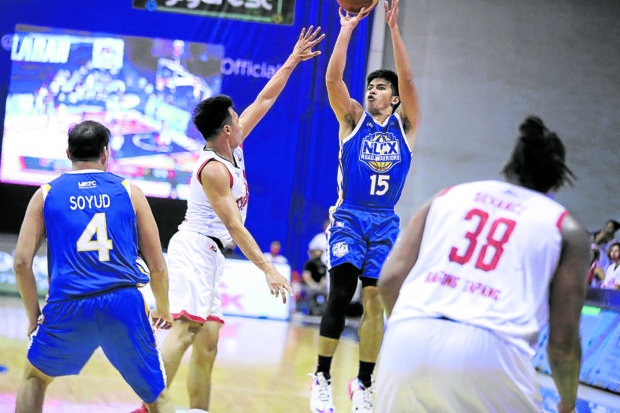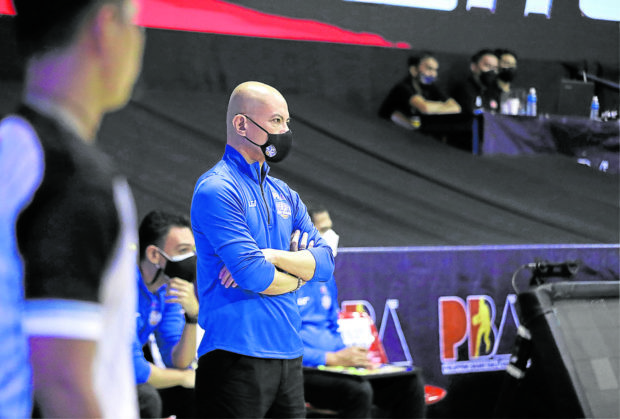Coach Yeng says tension ‘has eased’ as Kiefer allowed to play in Japan

Kiefer Ravena, here drilling a jumper off Scottie Thompson, will be out for a year after the Philippine Cup. —PHOTOS BY PBA IMAGES
NLEX returned to its winning ways on Sunday by overcoming an on-target Terrafirma side, 108-94, to climb to an even 2-2 in the Philippine Cup eliminations at Ynares Sports Arena in Pasig City.
And within that triumph was the Road Warriors’ coach clearing a personal hurdle.
“The tension has eased,” Yeng Guiao said, addressing for the first time the PBA’s decision allowing Kiefer Ravena to play in Japan.
“I’m a bit more relaxed now,” he added. “Because sometimes, we tend to think about the future.”
Guiao, however, emphasized that he was simply speaking for himself.
“I already said that even before [the resolution], the team is not distracted. It’s just my personal [take] that I’m relieved that it’s all settled.”
If it’s any indication, the Road Warriors looked remotely bothered by the Ravena situation. They opened their all-Filipino campaign with a narrow loss to Rain or Shine, but soundly beat defending champion Barangay Ginebra in their next game. In those two meetings, the young playmaker led the charge.
Ravena was a nonfactor in the victory over the Dyip, which pretty much gives fans a picture of the Road Warriors’ capabilities once he’s overseas. It remains to be seen, however, how his absence affects the team in the long run.
The league’s leadership on Saturday allowed Ravena to join his younger brother Thirdy in the B.League. But within that go-signal is a caveat: He can only do so for one year.
Commissioner Willie Marcial said Ravena had promised to return after his stint with the Shiga Lakestars. The league chief said the PBA is prepared to unleash heavy-handed sanctions—one that includes a five-year sit-out—should Ravena fail to uphold his end of the bargain.
“As I’ve previously said, that issue did not have any effect on the whole team whatsoever,” said Guiao.
The PBA announced a landmark decision last week when it also allowed Ray Parks Jr. to play in Japan after gaining a release from mother team TNT.
“[Basketball] is evolving. Before, there was no three-point shot, there were no penalties. The sport is evolving, so we have to adjust accordingly,” Marcial said.
“So we’re trying our best to determine what’s fitting for times,” he added.
Parks’ case, though, will be different as his rights will remain with the Tropang Giga and will have to serve a sit-out period of five years if he wants to return to the PBA. He is 28 years old now.
“We reviewed the possible scenarios with respect to the migration of players to other leagues, we have to affirm the principle that the sanctity of the contract should be respected,” said legal counsel Melvin Mendoza.
The sit-out period is a measure that the PBA put into place in situations where teams and players are unable to agree on a deal, giving teams a layer of protection from possible deserters.
The league has also ditched the salary cap for the first three picks in the Rookie Draft while limiting the age for incoming Fil-foreigners to 30 years old and under. INQ

